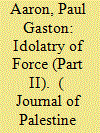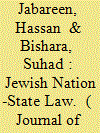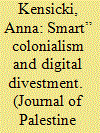|
|
|
Sort Order |
|
|
|
Items / Page
|
|
|
|
|
|
|
| Srl | Item |
| 1 |
ID:
164820


|
|
|
| 2 |
ID:
164816


|
|
|
|
|
| Summary/Abstract |
Germany's complex relationship to the issue of Palestine is often explained in terms of the country's past and its consequent affinity for Israel as the perceived homeland of Holocaust survivors. German policy decisions in the last two decades, including the sale of nuclear-capable submarines to Israel, seem to confirm this view. That notwithstanding, argues this article, Germany's Middle East policy and popular German perceptions of the conflict between Palestinians and Israelis must be placed in a more contemporary historical context of evolving political priorities. The article contends that the current political class' zealous identification with Israel is a qualitatively new phenomenon in Germany largely unrelated to moral considerations pertaining to the Nazi era. In addition to examining how this identification plays out more broadly in society, the article also attempts to locate possible fissures that could give rise to changes in official policy.
|
|
|
|
|
|
|
|
|
|
|
|
|
|
|
|
| 3 |
ID:
164818


|
|
|
|
|
| Summary/Abstract |
Building on “The Idolatry of Force: How Israel Embraced Targeted Killing,” published in the Autumn 2017 issue of the Journal of Palestine Studies, this companion piece examines the practices through which Israel's garrison state normalizes aggressive militarism and indifference to the pain of others. Political discourse and semantics, media, pedagogical instruction, religious training, and the shared experience of army service all feed into a warrior code and culture where combat and preparations for combat become second nature, and where violence, no matter how extreme and disproportionate, assumes collective legitimacy. A broad rhetorical repertoire is deployed to craft a narrative of virtue, sacrifice, and necessity. Key to this narrative are the threat to national survival posed by demonic enemies and the spiritual valor embodied and replenished in the struggle to vanquish them.
|
|
|
|
|
|
|
|
|
|
|
|
|
|
|
|
| 4 |
ID:
164817


|
|
|
|
|
| Summary/Abstract |
This analysis explores the origins and constitutional implications of Basic Law: Israel – The Nation State of the Jewish People (hereafter the Jewish Nation-State Law), enacted by the Israeli Knesset in July 2018. It examines the antecedents of the legislation in Israeli jurisprudence and argues that most of the law's provisions are the product of precedents established by Israel's Supreme Court, specifically the court's rulings delivered post-Oslo. The authors contend that the “two states for two peoples” vision of so-called liberal Zionists paved the way for Israel's right-wing politicians to introduce this law. Their analysis holds that the law is radical in nature: far from being a mere continuation of the status quo, it confers unprecedented constitutional status on ordinary policies and destabilizes the prevailing legal distinction between the area within the Green Line and the 1967 occupied territories.
|
|
|
|
|
|
|
|
|
|
|
|
|
|
|
|
| 5 |
ID:
164819


|
|
|
|
|
| Summary/Abstract |
The current willingness of major American Jewish organizations and leaders to dismiss the threat from white supremacists in the name of supporting Israel represents a new stage in the shifting relationship of U.S. Jews toward Zionism. In the first stage, during the late nineteenth and early twentieth centuries, the majority of U.S. Jews did not take to Zionism, as its goals seemed antithetical to their aspirations to join mainstream American society. In a second stage, attitudes toward Zionism grew more positive as conditions for European Jews worsened, and Jewish settlement in Palestine grew substantially. Following Israeli statehood in 1948, U.S. Jews began gradually to support Israel. Jewish groups and leaders increasingly characterized criticism of Zionism as inherently anti-Semitic and attacked Israel's critics. In a third and most recent stage, many major Jewish organizations and leaders have subordinated the traditional U.S. Jewish interest in combatting white supremacy and bigotry when it comes into conflict with support for Israel and Zionism.
|
|
|
|
|
|
|
|
|
|
|
|
|
|
|
|
| 6 |
ID:
164815


|
|
|
|
|
| Summary/Abstract |
Much has been written about how information communication technologies (ICTs) detract from nations' planning and development norms, but there remains insufficient theoretical examination of the way ICTs may drive extranormative national aims. This paper examines such a case by disentangling the complicated relationships between telecommunications, city planning, and economic development in one modern settler-colonial context. The author explores how planning and development norms are adulterated in Palestine-Israel to further a select set of interests, in the service of an evolving national project. Palestinian and Israeli demographics and telecommunications infrastructure on both sides of the Green Line are examined, revealing the role of these technologies in facilitating population dispersal, economic exploitation, and political control at various stages of settler colonialism.
|
|
|
|
|
|
|
|
|
|
|
|
|
|
|
|
|
|
|
|
|